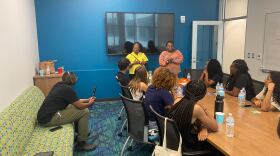Disillusioned with the current state of youth activism in the US, youth reporter Nassibah Bedreddine turned to civil rights movement elders who organized in the 60s and 70s to seek their guidance for youth organizers today. She spoke with former Winston-Salem Black Panther Party Communication Secretary, Hazel May Mack, and with Faith Holsaert, a veteran of the Student Nonviolent Coordinating Committee (SNCC).
NOTE: This transcript has been edited for brevity and clarity.

Nassibah on the idea for her story, and how it evolved:
“My initial pitch was centered almost exclusively around the Winston-Salem Black Panther Party. And I was also surprised that there was such a Black radical presence that was allowed to actually organize in the South. And that's initially what drew me to it.
Whenever people talk about activism in the '60s and '70s, the Black Panther Party is at the forefront of all that, as far as popular culture goes. And so to see that in the South, and feeling kind of down on how the activism landscape is looking today, I really, really wanted to not just look back on the Winston-Salem Black Panther Party, but try to learn from it.
And because there weren't a lot of former Black Panthers that were willing to actually come out and speak to me, I decided to make this more broad and cover radical activism in the '60s and '70s, to talk to its veterans today, and get their perspective on things, both their former work and also going forward, what the future of activism and organizing is going to look like.”
On who she chose to interview, and why:
“I wanted to speak with people who were organizing in the '60s and '70s in groups that centered youth. The Black Panther Party was mostly made up of younger people. Same with the Student Nonviolent Coordinating Committee (SNCC). Faith mentioned with her work with SNCC, they were invited to a lot of conferences with older activists. Even though some of those older activist groups didn't really approve of some of their methods, they still took care of them. And (the different tactics) didn’t mean that those youth groups weren't effective.
A main point of frustration that I have with the activism landscape today is that if you were a radical youth in the 60s or 70s, there was a place for you to go and organize and act, and I feel like there just isn't really anything comparable today. And that might be me looking back on the past with a kind of rose-tinted goggles … I just feel like there isn't anything comparable to the Black Panther Party or the Student Nonviolent Coordinating Committee today.”

On the impact of her interview with the leader of Black Workers for Justice, Angaza Laughinghouse.
"Angaza really did give me hope, as far as seeing real on-the-ground change occurring. He gave an entire, timeline of his work with Black Workers for Justice, and many organizations (he was involved with) before that. And him painting a picture of how communities did change for the better really showed that ... you do win a few battles. I mean, this summer, and this year in general, has been huge for labor. The writer's strike, the metal workers strike ... those small victories really do soothe the soul a little bit. Not all hope is lost."
On her biggest takeaway from the interview with former Winston-Salem Black Panther Party secretary, Hazel May Mack.
“The struggle never really ends. I know that's a little corny, but it really doesn't. Hazel is still a fixture in her community in Winston-Salem. Even after her work with the Black Panther Party, she opened up a school for children. So the work never really ends.
One thing I did learn throughout the whole experience is that change doesn't really have to happen in one fell swoop. It doesn't have to be a bunch of little victories, adding up to one grand victory. Sometimes those little victories just add up. You look around one day and you're like, ‘Oh, things are better than they were before.’ Like Hazel said during our interview: 'One hundred years ago, this conversation wouldn't have been possible.’ I don't know how to word it. It's just a feeling.”
On her biggest takeaway from the interview with SNCC Veteran, Faith Holsaert.
“What she said about the connections that you make with the people that you're organizing with was really heartfelt. I hope that whenever I do start to take organizing more seriously — whenever I can take it more seriously — it's something I really hope to experience. It gave me something to look forward to for sure. The people, you know? Working with the people, for the people.”








